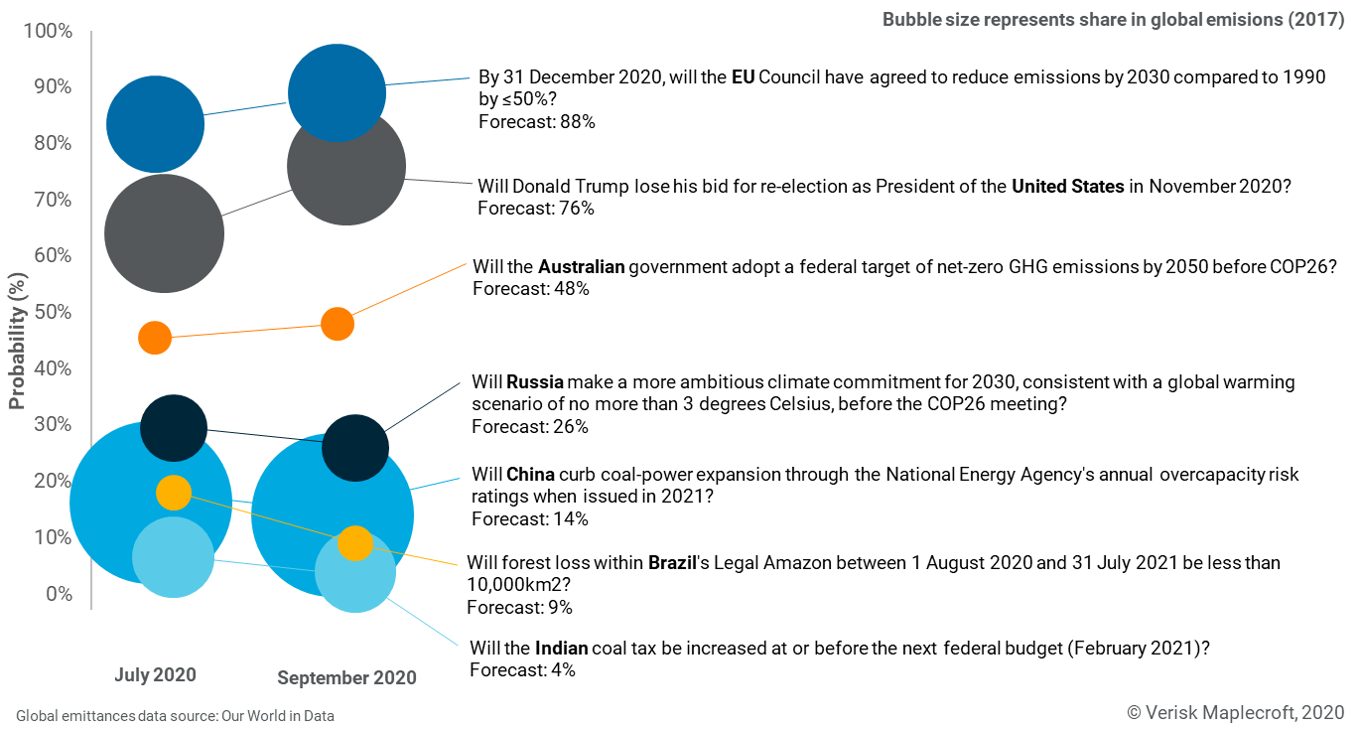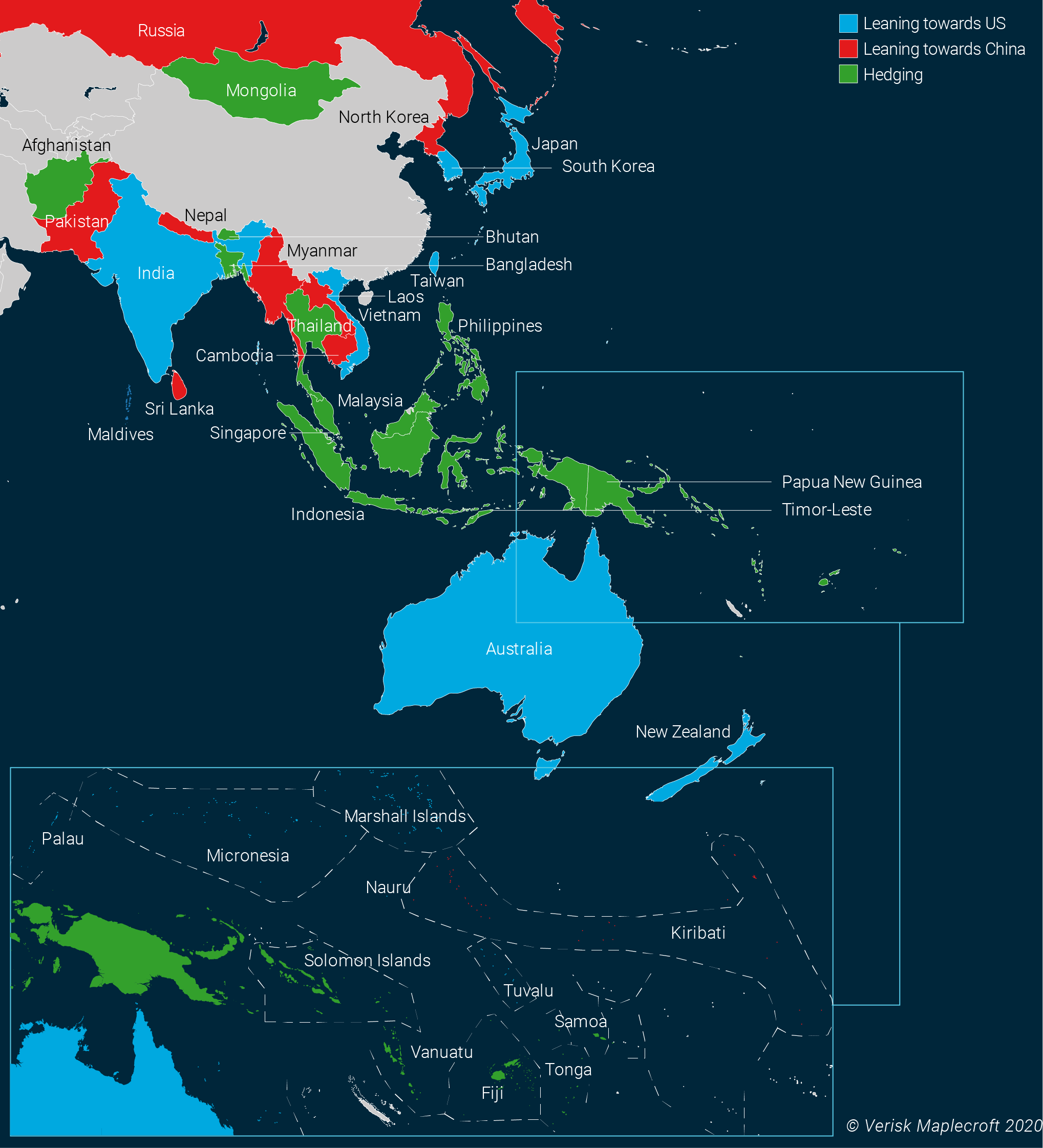Major emitters largely unaffected by Biden’s climate change focus
by Franca Wolf,
Biden’s election as US President has been hailed as a victory for climate change action. The incoming administration will seek to make climate change one of its core priorities, and advance multilateral efforts to fight global warming. However, we assess the immediate impact of Biden’s election on other major emitters will be limited, as their climate policies remain largely unaffected by the impending change in the White House.
World’s biggest economy set to advance energy transition
Details on Biden’s likely climate policies remain sparse, and we are currently designing the next forecasting question to serve as a proxy for Washington’s action on the energy transition. However, Biden’s commitment to re-join the Paris Agreement and plans to invest USD2 trillion to boost clean energy and climate sustainable practices will see world’s biggest economy advance its energy transition.
Business-as-usual in other major emitters
The break with the Trump administration’s scepticism of multilateralism and climate change has driven expectations of growing momentum for concerted global climate action under Biden. However, Biden’s election only marginally affects our latest forecast updates of the Energy Transition in major emitters.
For the EU, the US executive change has only limited impact on its climate agenda: we had already forecast the bloc will raise its 2030 emissions reduction target prior to the US election (see visual below). The marginally reduced likelihood of 87% (from 89% in September) expresses the risk of delay beyond the 31 December deadline. However, we are certain to see a raised 2030 target – with the question now being whether it will be a 55% or 60% cut. Either target would put the EU well ahead of the US.
Climate action as a – symbolic – differentiator between APAC countries
In the strategic US-China competition over influence in APAC (Asia-Pacific), we expect Biden to engage more strongly than Trump in the region. Biden’s focus on climate change carries the potential to make the issue more of a differentiator between those APAC countries leaning towards the US or China (see visual below).
While countries eager to curry favour with the Biden administration will likely increasingly reference climate change, we are unlikely to see Beijing pressure China-leaning states on climate action. However, as our forecasts show, a below 50% likelihood of climate action in India and Australia highlights the domestic hurdles that will stand in the way of concrete climate action in these US allies.
Crucially, this means that India and Australia are likely to react to Biden’s prioritisation of climate change with only symbolic actions. With India being a counterbalance to a rising China, and Australia being one of the US’ closest allies, Biden is unlikely to risk souring these relationships over climate inaction. This means that we are unlikely to see robust climate policies as a binding prerequisite for trade integration.
This will likely distinguish US-aligned countries in APAC little from China-aligned countries on practical climate progress. For China, we judge its 2060 carbon-neutrality target to be primarily about placating an international audience, rather than robust climate action in the short term: While we have increased the likelihood of curbs on coal-power expansion on the back of the 2060 target, we continue to consider it as unlikely. Similarly, Russia’s recently announced 2030 emissions reduction target is only climate action on paper, as the target actually allows emissions to rise.
Conclusion
The latest update of our forecast series highlights our scepticism that Biden’s expected focus on climate change in international diplomacy will result in concrete policy action in other major emitters, at least in the short term. We see a potential for climate change to become a more significant symbolic issue in the rhetoric of APAC states India and Australia leaning towards Washington in the regional US-China rivalry. However, we ultimately don’t assess them to be considerably more likely to concretely advance their energy transition in light of Biden’s election than China or Russia.

